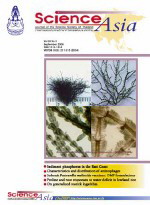ThaiScience
ThaiScience
SCIENCE ASIA
Volume 46, No. 1S, Month MARCH, Year 2020, Pages 27 - 35
Biological activity of the thrombospondin epidermal growth factor domain from banana shrimp (fenneropenaeus merguiensis)
Monwadee Wonglapsuwana, Natthaporn Khwanmuang, Panchalika Deachamag, Wilaiwan Chotigeat
Abstract Download PDF
Human epidermal growth factor (EGF) plays a role in cell proliferation and has been used to promote wound healing in patients. However, its role in cancer development via the EGF receptor (EGFR) has recently been reported. Thrombospondin (TSP) from banana shrimp (Fenneropenaeus merguiensis) contains an EGF domain at its carboxy-terminal end though it shares only 30% nucleotide sequence similarity with human EGF. It is challenging to investigate its biological activities. In this work, the EGF domain from banana shrimp TSP (TSP3-2) was cloned, and the recombinant His-TF-TSP3-2 was evaluated for its effects on proliferation, cytotoxicity and collagen production in a skin fibroblast cell line. Additionally, genotoxicity was determined using a hypoxanthine-guanine phosphoribosyltransferase mutation assay. Fibroblast cell proliferation increased 1.2–1.4 fold after treatment with 0.5–15 µg/mL His-TF-TSP3-2. The migration rate after 48 h of the His-TF-TSP3-2-treated cells (at 0.5 µg/mL) in a scratch assay was greater than that of the control. The collagen production was 1.7- and 1.2-fold increased after treatment with His-TF-TSP3-2 at 0.5 and 1.0 µg/mL, respectively. Low toxicity to the genome and no significant mutant frequency was found in the His-TF-TSP3-2-treated cells. Further investigations are required to confirm a potential use for this protein.
Keywords
thrombospondin (TSP), proliferation, growth factor, collagenSCIENCE ASIA
Published by : The Science Society of Thailand
Contributions welcome at : http://www.scienceasia.org/
